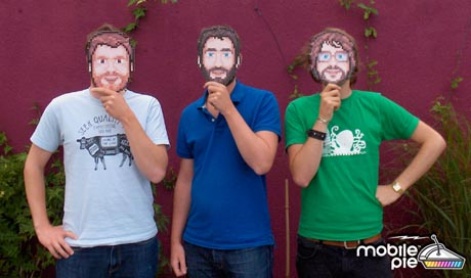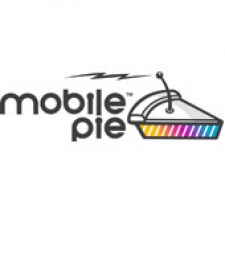The arrival of iPhone and the App Store has provided it with a channel for its creativity however.
It's released is first game - Tap n Slide! - and has submitted word puzzler Oh, My Word!
And it's also working away on the interesting B-Boy Brawl: Breakin' Fingers.
A good time then to catch up with co-founders Tom Dowding and Richard Wilson, and creative producer Will Luton to find out how the company started and where it's heading.
Pocket Gamer: So what's Mobile Pie's background?
Tom Dowding: Richard and myself met studying Computer Science at the University of Bristol. As the course progressed we often talked about the rapidly growing market for mobile content. The final year of our course was very business orientated, and we were required to write up a business plan for a possible company created around the software we had written. This gave us the confidence and belief that setting up our own business was a possibility.
After university we started playing around with J2ME games, and had some early success.
Our first title was shortlisted for the International Mobile Gaming Awards and received a publishing contract with HandsOn Mobile. We continued to create new ideas and hone our skills on new platforms, and gradually started taking on consultancy work. At the beginning of 2008, we were able to go full time and we've never looked back.
Will Luton: I came onboard at the end of May after a friend tipped me off about Mobile Pie. It was a good bit of luck as I fit in perfectly. I have a background in the more traditional, that is to say console boxed products, games design and production, but that brings a fresh perspective to the company, especially when it comes to partnering with publishers and thinking about the market positioning of games.

Mobile Pie (from left): Tom, Richard and Will
Your interests seem to be bit wider than many game developers, so does this change the sorts of products you make?
Will: Games are learning experiences; once you've discovered everything there is to know about a game it stops being fun, so having to formally think about education through the medium, for example, is good practice and something that we do with all our games. Also, working with a client to fulfill a vision is different to what most mobile developers do, especially with iPhone. If you work in a critical vacuum and without the pressures of milestones, you can easily lose track of what you set out to do and become self indulgent.
We've certainly had to keep ourselves in check with our original IP; take a step out of it and say "this isn't working" or "this feature will take too long to implement, we'll have to cut it". It can be tough, but you need to keep in mind that the game buying public is your client.
And it helps to work with thirdparties such as a publisher who will be honest about your product, as well as constantly play testing. We're heading to a level of gameplay refinement with our game B-Boy Brawl that we're happy with and it shows.
Richard Wilson: From a business point of view having a diverse portfolio is great as it lets us take advantage of lots more opportunities. It also helps with the cash flow when funding our own projects, which is essential once you move your business out of the bedroom and start getting employees.
Can you explain what the Pervasive Media Studio is, and why you think technologies such as location-based services and augmented reality are interesting?
Tom: The Pervasive Media Studio is an ideas incubator set up jointly between Watershed and Hewlett Packard, with additional support from the South West Regional Development Agency.
Its purpose is to bring together creative and technological people from lots of different backgrounds and disciplines, to contribute to ideas around pervasive media. It started at the beginning of 2008, which coincided with our own business going full time and was a key component in our early success.
Rich: We have worked on a few different location-based applications because it fitted in with our aims to be at the cutting edge of development and to fully utilise the benefits of mobile. Technologies such as GPS and on-board compasses have opened up a whole new avenue to explore, not only around social apps, but gaming as well.
This gives us something that traditional console gaming currently doesn't have and lets us deliver new experiences to the public. It's interesting because we are at the start of these features being used in games and there is plenty of scope for real innovation.
Will: From a design perspective they are really important. You can make a traditional console game and put it on a platform like iPhone or Android and, even if it's a best-in-class example of that genre, it will feel a little flat, simply because you aren't using the features the platform is offering and that other products are.
That's not to say all iPhone games should be multi-touch augmented reality games with GPS and internet-connectivity, but that designers should be aware and pull in features to enhance an experience.
For example, B-Boy Brawl can't be done on any other commercial platform as it requires a screen that can recognise four simultaneous touches, so we're offering a completely new experience for players which is facilitated by the platform. And being the geeks we are, the cutting edge gadgets get us all excited!
You've developed products on lots of platforms, so how does the iPhone compare?
Tom: I would without a doubt declare iPhone as the easiest mobile platform I have developed for. For me there was an initial steep learning curve because I was unfamiliar with the language and the development environment used, but there were heaps of tutorials and how-to guides to support me. It was a while before there were any decent forums, which was a disappointment, but now they are up and running, very active and have regular contributions from Apple staff.
Coming from J2ME, it was a joy to not have the usual concerns over performance, memory, and (most of all) such a high level of device fragmentation. There are plenty of thirdparty libraries too so there's no need to re-invent the wheel.
Will: It feels very free at the moment. The traditional mobile and console market is bogged down with licences and sequels from the major players and it has effectively crushed creativity, especially on the Wii. It's only EA that has taken any big risks with new IP on current generation platforms and I didn't think I would be saying that five years ago.
If you look at the top 25 games on the App Store, just three or four will be licenses. That's not to say that licenses don't exist for the platform, but that consumers are buying innovative products from small companies. The in-built user review system really helps, I think. It's so in your face that if a game is naff, even if it has the cast of Disney in Nike trainers riding in Porsche cars to a Coldplay soundtrack, consumers know about it.
So there's a much tighter correlation between quality and success then there is in any other videogame marketplace. And as we can bring quality games, but not multi-million dollar licenses, it allows us to compete on a more even footing with the big boys.
You've got Oh, My Word! coming out soon too.
Will: That's currently undergoing approval with Apple, so it should be out very soon. It was an idea which had been floating around for a while and when Samsung announced the Innovation Quest 2009 competition, it seemed like the ideal choice as it would be so easy and quick to put together.
After it was finished we liked it so much we wanted to get it out straight away and in to more hands, so we decided to port it the iPhone and iPod touch and it came out even better.
It's one of those games which just feels right and we've strived to give a level of polish you don't normally see on word games. They're often created in isolation by hardcore puzzle fanatics and filled with gruesome programmer art, but Oh, My Word! looks lovely.
What sort of games do you want Mobile Pie to be known for?
Will: We're expanding organically so we don't have any firm goals, but ultimately we want to be known for making games of a high-quality.
B-Boy Brawl has a lot of depth and scope in comparison to what companies of a similar size to us are doing at the moment, so if that does as well as we hope then we'll continue to make big games and take risks with concepts we like. It comes down to the consumer.
Also, we've recently become accredited developers for both DSiWare and PSP Minis and are in talks with a number of people about projects for that and have been offered a big license from a toy manufacturer for an iPhone title. We're constantly active in looking for opportunities for new games-related projects and that is part of my job description at Mobile Pie and what makes being here so fun.
You can find out more about what's happening at Mobile Pie over on its website, or its Twitterfeed.
Oh, My Word! is out, priced 99c, 0.79 or 59p [App Store Link]. There's also a free ad-funded version available [Link].





















